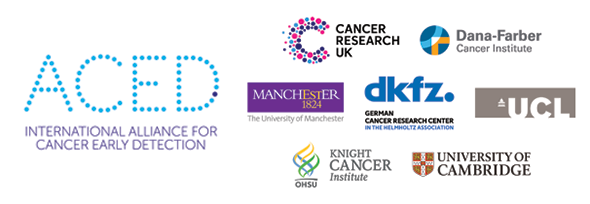
Submitted by Irena Rao on Thu, 20/02/2025 - 14:15
Two new partners have joined the International Alliance for Cancer Early Detection (ACED) as it moves into its next phase.
The £50m partnership between Cancer Research UK, University of Manchester, University College London, Knight Cancer Institute at OHSU and University of Cambridge will be joined by the Dana-Farber Cancer Institute and the German Cancer Research Center.
Director of the Early Cancer Institute at the University of Cambridge, Professor Rebecca Fitzgerald, is incoming chair of the Alliance. She said "the next phase of the expanding ACED network is an exciting opportunity for collaborations in early cancer detection."
"I am especially excited to be leading a new theme on interception – as a community we recognise that intervening to stop cancer in its track is an essential part of our mission to reduce late-stage cancer."
Making strides in early detection
Since 2019, ACED has established an extensive research portfolio encompassing biology, technology and trials, with highlights including the BCAN-RAY study to improve risk assessment of breast cancer in young women, and the bespoke ACED Training Programme to support the next generation of early detection researchers.
"Early detection plays a crucial role in reducing cancer mortality, but meaningful progress requires collaboration across disciplines and institutions," said Professor Tim Rebbeck, Professor of Cancer Prevention and Member Centre Director at the Dana Farber Cancer Institute.
"The Alliance for Cancer Early Detection is driving this effort by bringing together leading experts to advance cutting-edge research and innovation. Through this collaborative approach, ACED aims to accelerate scientific breakthroughs, improve public health, and lessen the impact of cancer for people everywhere."
Forging new partnerships
ACED is unique in uniting world-leading researchers from institutions around the globe to tackle the most pressing challenges facing cancer early detection research.
The new partnerships with the Dana-Farber Cancer Institute and the German Cancer Research Center bring vital expertise and resources to accelerate research, as well as helping the Alliance to broaden its research community and raise its international profile.
For over 75 years, Dana-Farber Cancer Institute has supported a range of cancer research, including basic science, clinical trials, population health studies, and community engagement. As the largest National Cancer Institute-designated Comprehensive Cancer Center, they work alongside six other Harvard-affiliated institutions to train the next generation of doctors and scientists.
The German Cancer Research Center (DKFZ) is the largest biomedical research institute in Germany with research spanning the entire translational continuum. Prevention is a major strategic focus of DKFZ, with the National Cancer Prevention Center combining high-level prevention research, education and training, and outreach and policy advice.
"By fostering partnerships between institutions, researchers, policymakers, and patients, ACED can accelerate progress, standardize best practices, and ensure that early detection strategies are widely accessible," said Michael Baumann, Member Centre Director at DKFZ.
"The involvement of various disciplines enhances our ability to address the scientific, medical, and societal challenges associated with early detection, ultimately benefiting patients worldwide."
Bringing patients into the heart of research
Over the next five years, the Alliance will commit a further £50m in funding to accelerate cutting-edge research in four major programmatic areas – immunology, hereditary cancers, inequalities, and interception – each supported by a patient advocacy champion, bringing patients and the public into the heart of cancer early detection research.
"As a global organisation, ACED offers the opportunity to provide a gold standard for Patient and Public Involvement and Engagement (PPIE) activity, demonstrating the many areas within research that can benefit from patient involvement. We want to capture the benefits to research that PPIE can bring to encourage other organisations to take this approach too," said Linda Galbraith, Chair of the PPIE Panel for ACED.
The Alliance looks forward to the next stage of this one-of-a-kind strategic collaboration, as they continue to work together to revolutionise cancer early detection for real-world patient impact.
